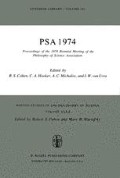Abstract
Professor E. A. Burtt 1 suggested that we might add “tertiary” qualities to our primary and secondary qualities when we undertake an analysis of reality. These tertiary qualities are the ones embodied in the human institutions of the world. He suggests that we may be arranging nature with our methodologies due to main conditions in us rather than due to main conditions in nature. Nothing can provide the satisfactory generalized concept of the world that does not entail extensive historical analysis of the major factors that have conditioned us, according to Burtt. The new cosmology would hardly be worth the effort, if it were merely the synthesis of scientific data or the logical criticism of the basic assumptions of that data, for Burtt. Sound insight must supplement scientific data and its assumptions, through the reasoned expression of the intellectual insight of all the ages. He goes on to point out that we see readily the role that wishful thinking has played in older methodologies, but we do not understand the role that wishful thinking plays in our own methodologies. The mechano-morphic period was absorbed in the mathematical nature of physical motion: they ignored the ultimate suppositions that they used in order to frame their laws and their hypotheses. Clarification is necessary and cannot proceed without the historical studies that can expose the fundamental motives and human factors in each of the characteristic analyses that have been adopted. In choosing between hypotheses of two kinds, the tertiary qualities are at work in us. The rise and fall of scholarly interests is conditioned by factors as yet totally unexplored. Burtt goes on to state that though science may reject final cause, it does harbor in its fundamental categories functioning values or tertiary qualities that remain completely unseen. A comparative study of the different stages of the growth of scientific thinking would throw light on the nature of our models of the universe and the tertiary qualities of the structure of contemporary scientific procedure.
Access this chapter
Tax calculation will be finalised at checkout
Purchases are for personal use only
Preview
Unable to display preview. Download preview PDF.
Bibliography
Benjamin, A. Cornelius: 1965, Science, Technology, and Human Values, University of Missouri Press, Columbia, Missouri.
Bridgman, P. W.: 1959, The Way Things Are, Harvard University Press, Cambridge.
Burtt, E. A.: 1932, The Metaphysical Foundations of Modern Physical Science, Doubleday, Garden City, New York.
Campbell, Norman Robert: 1957, Foundations of Science, Dover, New York.
Dampier-Whetham, William Cecil Dampier: 1929, A History of Science, Macmillan, New York.
Evans, Herbert M. (ed.): 1959, Men and Moments in the History of Science, University of Washington Press, Seattle.
Farber, Marvin: 1959, Naturalism and Subjectivism, Charles C. Thomas, Publisher, Springfield, Illinois.
Friedlander, Ernst: 1965, Psychology in Scientific Thinking, Philosophical Library, New York.
Haldane, J. B. S.: 1951, Everything Has a History, George Allen and Unwin, Ltd., London.
Helmholtz, Hermann von: 1904, Popular Lectures on Scientific Subjects, Longmans, Green, and Co., New York.
Humphreys, Willard C: 1968, Anomalies and Scientific Theories, Freeman, Cooper & Company, San Francisco.
Jordan, Pascual: 1955, Science and the Course of History, translated by Ralph Manheim, Yale University Press, New Haven.
Kemeny, John G.: 1959, A Philosopher Looks at Science, D. van Nostrand, Princeton, New Jersey.
Maslow, Abraham H.: 1966, The Psychology of Science, Harper & Row, New York.
Müller, Herbert J.: 1943, Science and Criticism, Yale University Press, New Haven.
Ornstein, Martha: 1928, The Role of Scientific Societies in the Seventeenth Century, University of Chicago Press, Chicago.
Scheffler, Israel: 1967, The Anatomy of Inquiry: Philosophical Studies in the Theory of Science, Alfred A. Knopf, New York.
Struik, Dirk J.: 1957, The Origins of American Science, Cameron Associates, New York. Original title: Yankee Science in the Making, 1948.
Struik, Dirk J.: 1962, Yankee Science in the Making, new, revised edition, Collier Books, New York.
Taylor, Lloyd W.: 1941, Physics: the Pioneer Science, Houghton Mifflin, Boston.
Wiesner, Jerome B.: 1961, Where Science and Politics Meet, McGraw-Hill, New York.
Williams, Henry Smith: 1904, A History of Science, assisted by Edward H. Williams, Vols. 1–5, Harper & Brothers, New York.
Author information
Authors and Affiliations
Editor information
Editors and Affiliations
Rights and permissions
Copyright information
© 1976 D. Reidel Publishing Company, Dordrecht, Holland
About this chapter
Cite this chapter
Paterson, A.M. (1976). Velikovsky Versus Academic Lag (The Problem of Hypothesis). In: Cohen, R.S., Hooker, C.A., Michalos, A.C., Van Evra, J.W. (eds) PSA 1974. Boston Studies in the Philosophy of Science, vol 32. Springer, Dordrecht. https://doi.org/10.1007/978-94-010-1449-6_27
Download citation
DOI: https://doi.org/10.1007/978-94-010-1449-6_27
Publisher Name: Springer, Dordrecht
Print ISBN: 978-90-277-0648-5
Online ISBN: 978-94-010-1449-6
eBook Packages: Springer Book Archive

